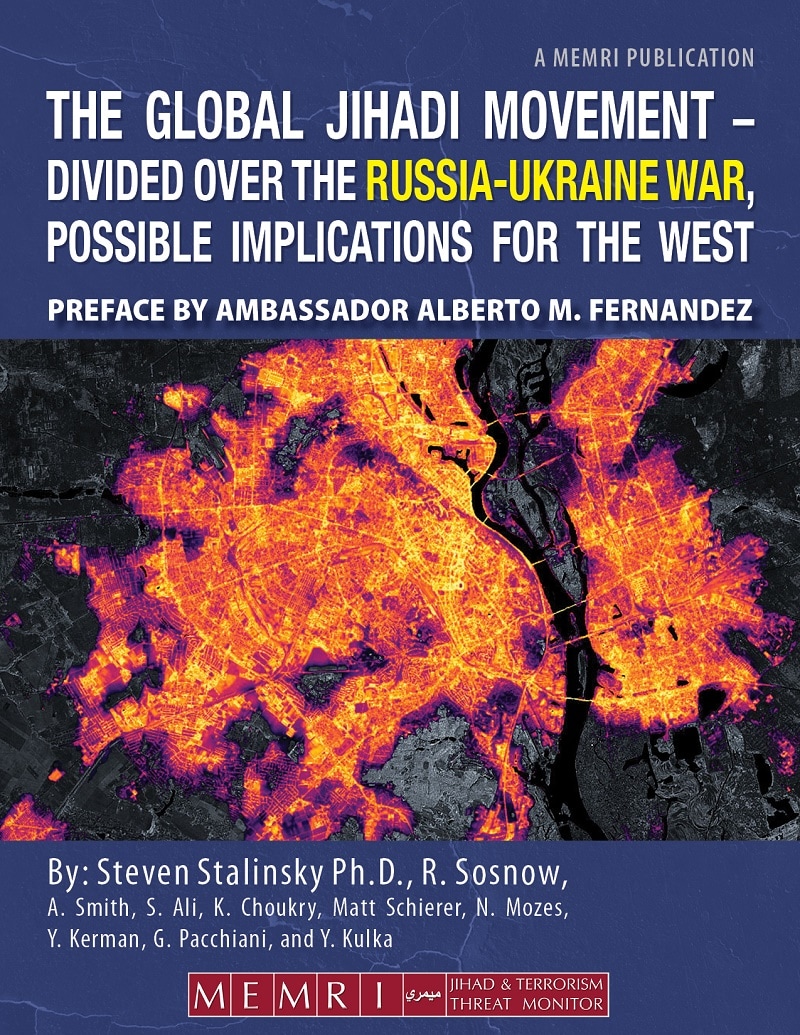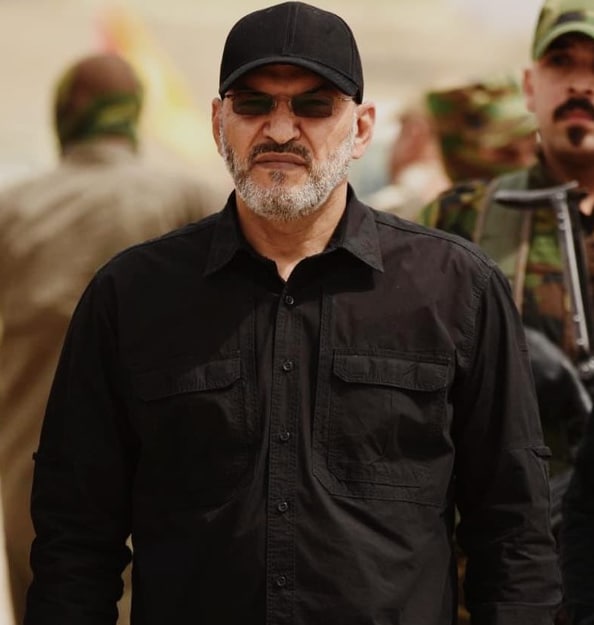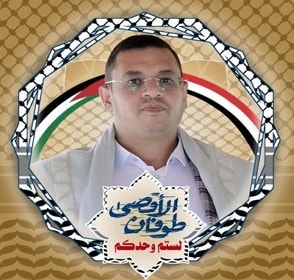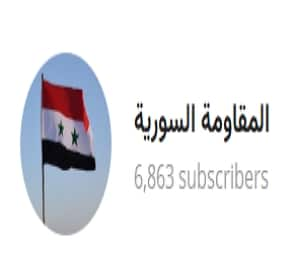Table of Contents
-
Preface: A Kind Of World War, By Ambassador Alberto M. Fernandez, MEMRI Vice President
-
Introduction
-
In The Ukrainian And Russian Region: Leading Muslim Clerics' Views On The War And On Muslims' Participation In It
-
Jihadis On The Ground In Ukraine
-
ISIS-Affiliated Media And Supporters On Telegram, Rocket.Chat, Facebook: Russia-Ukraine War Is "Divine Punishment For The Unbelievers"; "May They Continue To Destroy Each Other"
-
Al-Qaeda Media, Supporters, And Affiliates: "Oh Allah, Ignite The Flame Of War Among The Nations Of Unbelief"; May Ukraine Become A "Graveyard For Putin's Soldiers"; The War "Has Hindered The International Community From Providing Any Help To The Somali Government" To Fight Us
-
Afghanistan: Taliban Urges "Peaceful" Resolution, Hizb-ut Tahrir Afghanistan Calls The Crisis An Opportunity To Establish Caliphate
-
Iran, Iranian Russia-Affiliated Telegram Channels, And Iran's Shi'ite Militia Proxies In The Region
-
Hamas, Palestinian Islamic Jihad, And Other Palestinian Jihadis
-
Individual Figures And Leaders In Syria
-
Jihadis And Imams In The U.S. And The West
-
Independent Jihadis Speculate About The War's Impact And Whether Muslims Should Become Involved
Preface: A Kind Of World War
By: Ambassador Alberto M. Fernandez, MEMRI Vice President
More than any other war since the real Second World War, the Russia-Ukraine War has some of the aspects of an actual world war, certainly more than such bloody regional conflicts as the Korean War or Vietnam War. Both those conflicts had a global dimension, and involved more than a few countries on both sides, but lacked some of the broader economic, political, and security aspects of Russia's invasion of Ukraine in February 2022. The U.S.-led coalition war launched against Saddam Hussein's Iraq in 2003 perhaps comes closest to the Ukraine War, in that while the global economic effects were limited, it did lead important global developments – including the turbocharging of the global jihadist movement and the rise of ISIS.
Russia's war in Ukraine and the West's reaction to it have impacted foreign, energy, food, and defense policy across the globe, from Latin America to Sub-Saharan Africa, throughout the Middle East, and into Asia. It has led to the easing of sanctions on Venezuelan oil and Sudanese generals, and the search for every sort of weapon and ammunition and human cannon fodder, on the part of the Russians and their adversaries in the West, in every corner of the planet.
MEMRI's comprehensive new report "The Global Jihadi Movement – Divided Over the Russia-Ukraine War, Possible Implications for the West: A One-Year Review" provides a minutely detailed deep dive into this war's impact across the "jihadosphere" – the media, information, and propaganda space where Islamic extremists communicate amongst themselves and to the outside world.
Not surprisingly, a prevalent view among jihadis is glee at non-Muslims killing each other – "The Cross has collided with the Cross" and "Oh Allah, ignite the flames of war among the nations of unbelief." Or, as ISIS dubbed it, these are "wars between Crusaders and Crusaders." Like some Western governments, jihadis are in no hurry for this war to end. The more damage it inflicts on both sets of "infidels," the better.
Beyond the jihadis, of course, there is profound ambivalence in the Middle East about the conflict because of how the U.S. and Russia are viewed by many there. Both are regarded unfavorably in general, although regional variations are important. Russia's allies in the Axis of Resistance – Syria, Iran, and its assorted militias and death squads in Iraq, Syria, Yemen, and Lebanon – are not only rhetorically pro-Russian but actual participants to some degree. But even individuals and regimes less committed to Russia see American and Western interference in the region and beyond, and so fail to accept the legalism and propaganda spin on how the intervention by the U.S. and its allies in Iraq or Libya (or by Turkey in Syria and Iraq, or by France in African states, or Israel's annexation of the Golan Heights) differs very much from Russia's aggression against Ukraine. But just like the brutal Assad regime is among Russia's greatest supporters, so are Syrian jihadis in Idlib, for years the targets of Russian airstrikes, some of the most open supporters of Ukraine, since "every sincere person in Syria rejoices if the Russians are harmed."
This ambivalence about the conflict and about the West has not prevented Muslims from fighting on both sides. Both sides have their Chechens (and their neo-Nazis). Both sides have international fighters who include Muslims. Islamist Turkey sent weapons to Ukraine, and subsequently by Islamist Iran sent weapons to Russia. Realpolitik and self-interest trumped all other considerations.
Ultimately, the West's greatest weakness in selling its side of the Ukraine story is the perception of hypocrisy. People in the region don't believe that the West's piously touted "rules-based international order" has been or is now applied to them. They may go along with the West because of narrow self-interest, or because they think Russia may lose – but they will not do so out of a conviction that the causes promoted by the West, Ukraine included, are particularly righteous. The biggest damage to Russia's reputation as a result of the Ukraine conflict will be, in the eyes of many in the region, its increasingly blatant symbiotic relationship with Iran.
What supreme irony it is that the biggest bone of contention about the U.S. for the majority Sunni Muslims of the region – that Obama's and Biden's America was weak on Iran and wanted to empower the mullahs – is beginning to be surpassed by the perception that Russia is, even more than the Americans, completely and dangerously in Iran's corner. Russia's alliance with Iran comes with far more baggage for regional Muslim audiences than whatever miseries the Kremlin has inflicted or will inflict on the Ukrainians. As is the case with this richly sourced report, MEMRI's researchers and translators will be among the first to document and report these coming shifts in sentiments, public opinion and policies.
Ambassador Alberto M. Fernandez
Vice President
Middle East Media Research Institute (MEMRI)
Washington, D.C.
Introduction
Since the beginning of Russia's invasion of Ukraine on February 24, 2022, jihadi leaders, groups, and supporters have been reacting to the war, discussing online how it should be viewed and what its ramifications for issues important to them might be.
Recurring themes in jihadis' online discussion of the war include statements that the war is "divine punishment for the unbelievers" and that the sides should destroy each other, prayers and appeals for war to expand among the non-Muslims, and hopes that Ukraine will be a "graveyard" for Russia.
Some jihadi groups and supporters said that the war is not the Muslims' concern, and some even expressed the view that the distraction of the war gives Muslims a chance to establish a caliphate or carry out terror operations.
The major jihadi groups had a range of views on the war and how to best take advantage of the opportunities it offered. In the early weeks of the war, many jihadis, including supporters of Al-Qaeda and the Islamic State (ISIS), suggested that the escalation of the Ukraine crisis would further weaken the West and could culminate in a great conflict that will destroy the U.S.
As this report details, jihadi clerics involved in the Syrian jihad and supporters of the Syrian jihad have urged the mujahideen to exploit Russia's preoccupation with Ukraine to launch new offensives against the Russian-backed Assad regime and to topple it.[1]
Also in Syria, Chechen jihadis such as the Idlib, Syria-based Ajnad Al-Kavkaz group, which has been marginalized in Syria by Hay'at Tahrir Al-Sham (HTS), found a new purpose in the war. It is reported that the former emir of the Rustam Azhiev group, along with dozens of his fighters, are now fighting alongside Ukrainian troops against Russia. Videos and photos documenting their presence in Ukraine continue to surface on jihadi social media accounts.
After announcing a "blessed campaign to take revenge" for the killing of ISIS leader Abu Ibrahim Al-Hashimi Al-Qurayshi in February 2022 in Syria, ISIS called on its operatives and supporters to take advantage of opportunities presented by the war in Ukraine, and attack while the West was distracted.[2]
ISIS's weekly newsletter Al-Naba' wrote in a May 2022 editorial about a meeting of the Global Coalition Against ISIS that was held in Morocco, and argued that the war in Ukraine will exhaust the West's resources for countering ISIS in Africa and the Middle East.[3]
Additionally, a pro-Al-Qaeda magazine, "Wolves of Manhattan," proposed that its supporters find a way to get hold of weapons being handed out to civilians in Ukraine and then use them against Europeans.[4]
With regard to the Iran-backed Shi'ite militias in Iraq, Syria, and Yemen, as well as Hizbullah in Lebanon, Iran has been influencing their positions.
In the early days of the war, Telegram channels affiliated with Iraqi militias even promoted calls for Iraqis to enlist in the Russian forces by sharing posts alleging that Iraqi communists were pouring into the Russian Consulate in Basra to express their readiness to fight against Ukraine. These channels continue to post videos, songs and poster glorifying Russian President Vladmir Putin, and to voice their support for Russia as a partner in Iran's axis of resistance.[5] Moreover, some of these channels claimed that they had hacked a Ukrainian government website, as part of their support for Russia.[6]
Telegram channels affiliated with these militias even called on the militia leaders to recognize the independence of the self-proclaimed "People's Republics" – Donetsk and Luhansk – that were controlled by pro-Russian forces.
The Syrian regime and the Houthi Ansar Allah movement in Yemen had already declared their support for Russia, and Abu Hussein Al-Hamidawi, the Secretary-General of the Hizbullah Brigades in Iraq, did as well.
However, several days after the Russian invasion, and when it emerged that Russia was not going to subjugate Ukraine immediately, Al-Hamidawi announced that it was forbidden to support any side because both of them are "oppressors."[7]
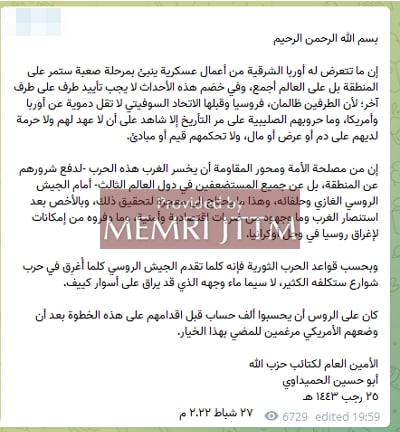
Al-Hamidawi's announcement on Sabereen News
Two weeks after the Russian invasion, leaders of the Al-Nujaba Movement and the Hizbullah Brigades in the city of Ma'adan in Al-Raqqa province, Syria, met to talk about the possibility of exploiting Russia's preoccupation with the war in Ukraine to increase the presence of pro-Iran forces in regions west of the Euphrates River. This was reported on March 19 by a Syrian opposition website. According to the website, each militia would send 100-150 fighters to the region, and there were plans to hold additional meetings about increasing the pro-Iranian militia presence west of the Euphrates, from the Syrian desert to Rif Dimashq.[8]
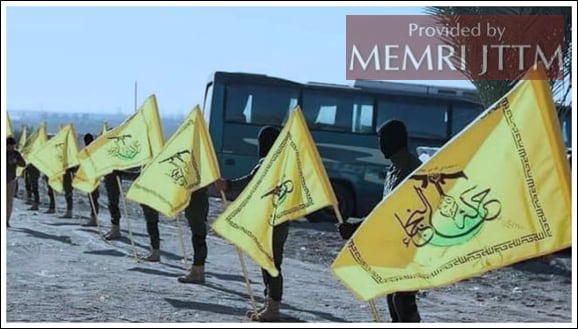
Eyeofeuphrates.com
A prevalent view among jihadis is that Western media are devoting more coverage to the Russia-Ukraine conflict than they have to wars in Muslim countries like Iraq and Afghanistan. On Facebook in late February 2022, a pro-jihad user shared a widely circulated meme illustrating the double standard regarding wars involving Muslims and non-Muslims. The meme shows a parent labeled "World's Attention" holding up a child labeled "Ukraine" in a swimming pool. A child drowning in the pool is labeled "Palestine" and a skeleton at the bottom of the ocean is labeled "Syria, Lybia [sic], Iraq, Yemen, Bosnia, Kashmir."
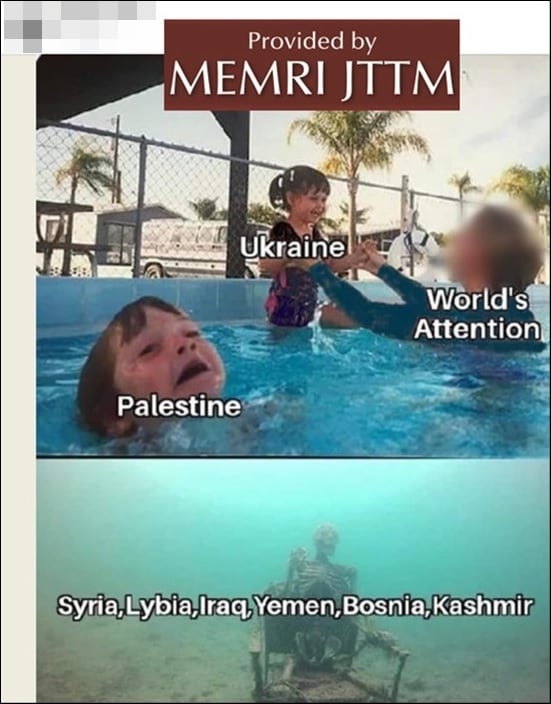
Depicting the disparity between the world's attention to Ukraine and its disregard of the crises in Arab and Muslim countries (Facebook, February 25, 2022)
Additionally, pro-ISIS media published a series of posters illustrating the Western media's alleged double standard in reporting on the Russia-Ukraine war versus Middle East wars.
About This Report
The MEMRI Jihad and Terrorism Threat Monitor (JTTM) project, which monitors, translates, and analyzes Islamist terrorism and violent extremism worldwide, has tracked jihadi reactions to the Russia-Ukraine conflict since its beginning.
In addition to information on jihadis fighting in the conflict, primarily on the Ukrainian side, and on the views of Muslim leaders in the region regarding it, this report comprises a wide range of examples of reactions from major jihadi organizations – ISIS, Al-Qaeda, the Idlib, Syria-based Hay'at Tahrir Al-Sham, the Somalia based - Al-Shabab, the Afghan Taliban, and Iran-backed militias in the region – and their media outlets and supporters. It also presents in-depth thoughts about and reactions to the war by prominent individual jihadis, both in the region and in the U.S. and West. The posts are on encrypted and password-protected platforms such as Telegram, Rocket.chat servers, chat channels on the TechHaven network, news outlets, and private websites, as well as on mainstream platforms such as Facebook, Twitter, YouTube, and Instagram.
In The Ukrainian And Russian Region: Leading Muslim Clerics' Views On The War And On Muslims' Participation In It
According to Pew Research Center data dated December 2022, Ukraine's Muslims number about 730,000, comprising 1% to 2% of Ukraine's population.[9] Top Muslim clerics in the region have expressed divergent views on the war.
Top Ukrainian mufti Sheikh Said Ismagilov called for Muslims to defend their homeland. In a fatwa issued the same day as the Russian invasion, he wrote: "In this difficult time, I call you all to defend Ukraine against Russian armed aggression. Those of you who can be soldiers, join the ranks of the Armed Forces of Ukraine, the National Guard, and territorial defense battalions. And those who cannot be soldiers, become volunteers and help the army. Only together will we repel aggression and liberate the occupied territories of Crimea and Donbas. In our unity and joint efforts is the way to a strong, free, prosperous Ukraine."[10]

Sheikh Said Ismagilov (Source: Religious Information Service of Ukraine, April 13, 2020)
Russian Chief Mufti Talgat Tadzhuddin announced in April 2022 that the war against Ukraine constituted jihad for Muslims, and that any Muslim who dies in the fight is a martyr. He stated that the Central Muslim Spiritual Directorate in Russia had "issued a fatwa [stating] that any Muslim who takes part in the [Ukraine] war... taking part in the defense of the homeland and our sanctities... [and] dies while participating in this war is considered a martyr."[11]


To view the clip of these statements by Chief Mufti of Russia Talgat Tadzhuddin on MEMRI TV, click here or below.
Chechen Mufti Salakh Mezhiev posted a special appeal on February 27, 2022 to the Chechen people regarding the events in Ukraine on the Instagram account of "Grozny" ChGTRK (Chechen State TV and Radio Company).

Chechen Mufti Salakh Mezhiev (Source: Eng.kavkaz-uzel.eu/articles/58364, February 27, 2022)
He said that those who went to fight in Ukraine had "gone to jihad" because, together with the NATO, "all the dirt" and everything that is unacceptable according to religion will come to Russia. He added: "Therefore, those who fight there, they fight for the sake of the Quran, for the sake of Allah, so that this dirt does not spread among us. They are at jihad, there is no doubt about that."[12]
Additionally, it was reported in September 2022 that Uzbekistan's top religious authority, the Muslim Board, had urged Uzbeks not to become involved in the Ukraine conflict, saying that it was un-Islamic to do so. The Board stated that members of some "terrorist organizations" were recruiting Muslims to fight in the Ukraine conflict on the pretext of jihad.[13] The announcement came after the country warned its citizens not to join foreign armies in exchange for expedited citizenship, after Russia offered citizenship to those who sign up to fight on its side and Ukraine declared that it had captured Uzbeks fighting alongside Russians.[14]
Jihadis On The Ground In Ukraine
Chechen Jihadis In Ukraine
Abdul Hakim Al-Shishani, aka Rustam Azhiev, Former Emir Of The Syria-Based Chechen Jihadi Group Ajnad Al-Kavkaz
Pro-jihadi Twitter accounts announced on October 10, 2022 that Abdul Hakim Al-Shishani, aka Rustam Azhiev, former emir of the Syria-based Chechen jihadi group Ajnad Al-Kavkas, had arrived in Ukraine, and would be overseeing the Separate Special Purpose Battalion (OBON) of the Armed Forces of the Chechen Republic of Ichkeria.[15] Ajnad Al-Kavkaz, comprising experienced fighters from Chechnya and other regions in the Caucasus, operates in Idlib and surrounding areas where Hay'at Tahrir Al-Sham has full control,[16] and is critical of Russia's invasion of Ukraine.[17] On Telegram, a Russian-language jihadi channel reported on ctober 10 that an AK source had confirmed Al-Shishani's arrival in Ukraine, along with some of the group's fighters. According to Ukrainian intelligence, on October 15 Al-Shishani was promoted to the rank of colonel of the armed forces in exile of the Chechen Republic of Ichkeria.[18]
A Russian-language Telegram channel which posts news from Chechnya shared, on October 16, 2022, photos showing Al-Shishani at a meeting with other commanders in Ukraine. In a second post that included a YouTube video of the meeting, the channel stated that Al-Shishani had been appointed commander of the Ichkerian unit, and that Al-Shishani would be sending his own video message later. It also shared a photo of Al-Shishani's Ukrainian passport.[19]
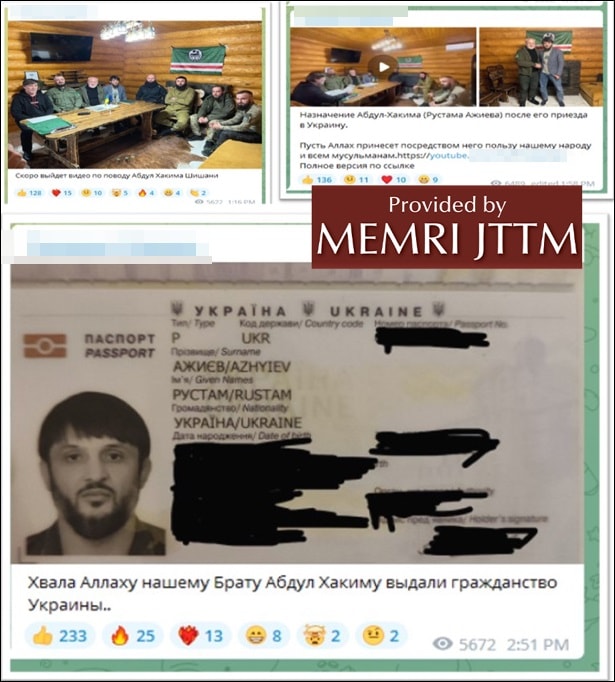
On October 18, the channel shared a video showing Al-Shishani recording a video message together with two other Chechen leaders: Akhmed Zakaev, the former prime minister of the unrecognized Chechen Republic of Ichkeria, and Abdulа Ortkhanov, а minister of state of the unrecognized Chechen Republic of Ichkeria.[20]

Additionally, on October 23, 2022, a Telegram channel opposed to Hay'at Tahrir Al-Sham (HTS) said that Al-Shishani had arrived in Ukraine to join the war against Russia. The channel added that he had been accompanied by 70 Ajnad Al-Kavkaz fighters, and that Ajnad Al-Kavkaz had been pressured to leave Syria by HTS leader Abu Mohammad Al-Joulani, who ordered the group to halt its attacks on Russian forces in Syria. According to the post, Al-Joulani had warned Ajnad Al-Kavkaz of possible arrest, expulsion, or assassination if the fighters disobeyed his orders. The channel also said that Al-Joulani coordinated with the "intelligence agencies" of other countries to facilitate the departure of AK fighters to Ukraine.[21]
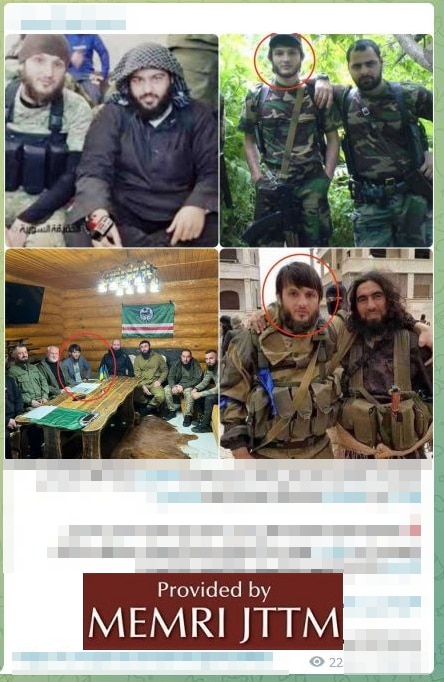
A website that covers news concerning Chechnya reported on November 10 that Al-Shishani and his regiment would be part of the OBON of the Armed Forces of the Chechen Republic of Ichkeria.[22] This news was also shared by a Russian language pro-jihadi Twitter account. In a second tweet, the account stated that Al-Shishani had commanded the Central Front (Amir of Grozny) of the Armed Forces of the Chechen Republic of Ichkeria from 2007 to 2009 and had been emir of Ajnad Al-Kavkaz between 2013 and 2019.[23]
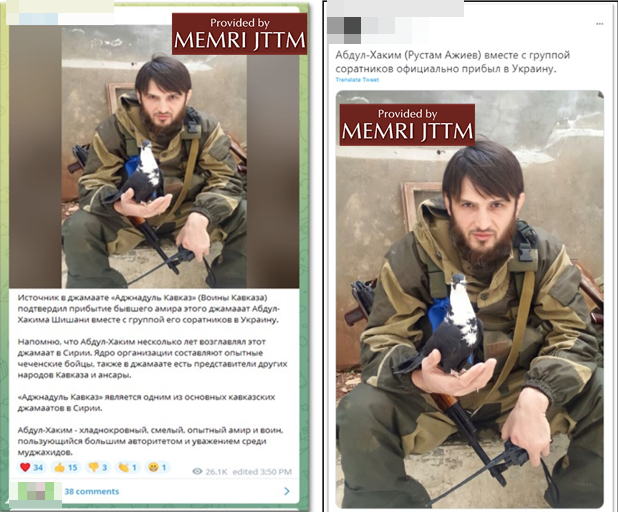
On January 7, 2023, a pro-jihadi Twitter user who states in his bio section that he is a "big fan of Muslim combat sports athletes" posted footage of Al-Shishani fighting against Russia in the Ukrainian city of Bakhmut, writing: "And Rustam Azhiev (Abdul Hakim Al-Shishani) is already out there fighting Russian terrorists in Bakhmut. The brother is a true veteran of many wars and battle fronts."[24]
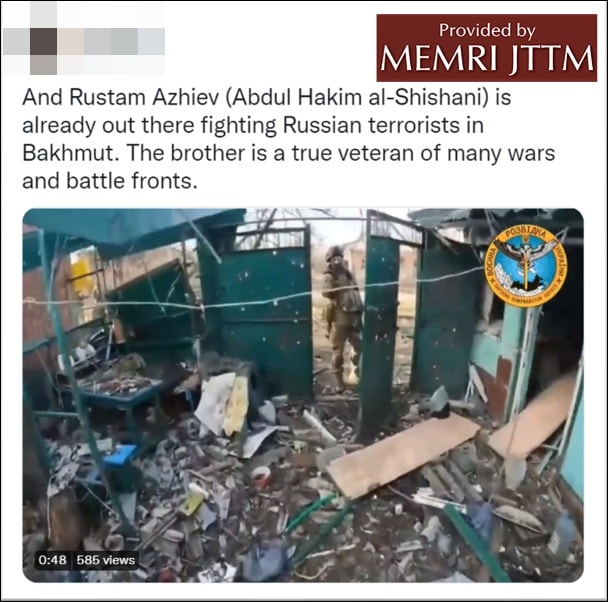
The video, which has the logo of Ukraine Defense Intelligence, showed Al-Shishani in military gear using a shoulder-fired launcher while carrying out a raid.



On January 9, 2023, a pro-HTS Telegram channel shared photos of Al-Shishani in Bakhmout.


In response to the video, a prominent pro-Alqaeda Jordan-based jihadi ideologue Abu Muhammad Al-Maqdisi asked which banner Al-Shishani was fighting under in Ukraine and why he was dragging young Muslims to fight these battles. Lamenting how some jihadis had spent years waging jihad but never understood that jihad is a "means to support monotheism," Al-Maqdisi argued that fighting "to liberate the land of the unbelievers is not jihad for the sake of Allah."[25]
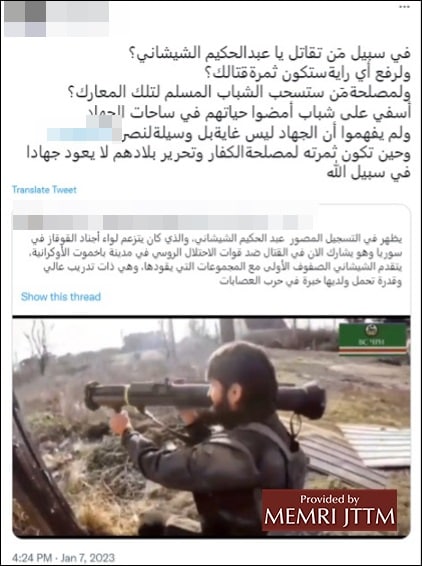

In a brief interview aired January 31, 2023 by the UAE-based Alaan TV, Al-Shishani said that his group and Ukraine "have a common enemy." In response to the interviewer's question " "And how will you fight this enemy if the war in Ukraine ends?" he replied, "If I can return to my country, I will fight them from there, God willing." He added that he hoped and aimed to achieve a unified Chechnya under one national leadership, stating: " We believe that this will happen, if not today, then tomorrow. We believe that we will return, and we will have our independent country, inshallah."
View Al-Shishani's statements on MEMRI TV here or below:
*Steven Stalinsky Ph.D. is Executive Director of MEMRI; R. Sosnow is Lead Editor at MEMRI; A. Smith, S. Ali, K. Choukry, Matt Schierer, N. Mozes, Y. Kerman, G. Pacchiani, and Y. Kulka are Research Fellows at MEMRI.

Note to media and government: For a full copy of this report, send an email with the title of the report in the subject line to media@memri.org. Please include your name, title, and organization in your email.
To view this report in full, you must be a paying member of the JTTM; for membership information, send an email to jttmsubs@memri.org with "Membership" in the subject line.
[1] See MEMRI JTTM report Syria-Based Jihadi Clerics Predict Russian Military Involvement In Syria Will Escalate Following Invasion Of Eastern Ukraine, Hope Mujahideen In Syria Will Defeat Russian Forces, February 22, 2022.
[3] See MEMRI JTTM report Urging Jihad With Money, Media And Migration, ISIS Editorial States: Global Coalition Against ISIS In Africa Will Fail, Group 'Succeeded In Exporting Jihad To All Parts Of The World, June 10, 2022.
[3] JTTM report Urging Jihad With Money, Media And Migration, ISIS Editorial States: Global Coalition Against ISIS In Africa Will Fail, Group 'Succeeded In Exporting Jihad To All Parts Of The World', June 10, 2022.
[4] See MEMRI JTTM report Syria-Based Jihadi Clerics Predict Russian Military Involvement In Syria Will Escalate Following Invasion Of Eastern Ukraine, Hope Mujahideen In Syria Will Defeat Russian Forces, February 22, 2022.
[5] MEMRI JTTM report Telegram Outlet Linked To Iraqi Shi'ite Militias Glorifies Putin As 'The Man Of Axis' In Song, Posts Video Lauding Putin's Weaponizing Of Energy, Poster Glorifying A Russian General, October 11, 2022.
[6] JTTM report Iraqi Hacker Group Team Linked To Iran-Backed Militias Claims Hacking Of Ukrainian Government Website, October 18, 2022.
[7] See MEMRI JTTM report Hizbullah Brigades: One Should Not Support Either Side In The Ukraine War; It Will Take A Miracle For Russia To Win, February 28, 2022.
[8] Eyeofeuphrates.com/ar/news/2022/03/19/4691, March 19, 2022.
[9] Pewforum.org/2015/04/02/religious-projection-table/2020/number/all, accessed March 7, 2022.
[10] MEMRI JTTM report HTS Cleric Calls On Ukrainian Muslims To Form Political Body To Fight Russia, Safeguard Muslim Interests In Post-War Ukraine, March 7, 2022.
[11] MEMRI Special Dispatch No. 9953, Chief Mufti Of Russia Talgat Tadzhuddin: A Fatwa Has Been Issued Obligating Muslims To Fight Alongside Russia In Ukraine; This Is A Holy Jihad, Those Who Die Fighting Are Martyrs, May 9, 2022.
[12] Eng.kavkaz-uzel.eu/articles/58364, February 27, 2022.
[13] Newarab.com/news/muslim-clerics-warn-uzbeks-against-joining-russia-ukraine-war, September 23, 2022.
[14] Newarab.com/news/uzbekistan-warns-citizens-not-join-foreign-armies, September 22, 2022.
[15] See MEMRI JTTM report: Russian-Language Jihadi Telegram Channel: Source Affiliated With Syria-Based 'Ajnad Al-Kavkaz' Confirms Arrival Of Chechen Jihadi Commander To Ukraine; Local Media: Commander Will Fight Alongside Ichkerian Separate SpeciAl-Purpose Battalion, October 13, 2022.
[16] MEMRI JTTM report Jihadi Telegram Outlet Accuses Hay'at Tahrir Al-Sham Leader Abu Mohammad Al-Joulani Of Pressuring Chechen Fighters To Leave Syria For Ukraine, October 24, 2022.
[17] See MEMRI JTTM report: Syria-Based Chechen Jihadi Group Criticizes Afghan Taliban For 'Shaking Hands' With Russia-Backed Chechen Leader, August 22, 2022.
[18] Jpost.com/international/article-728127, January 10, 2023.
[19] MEMRI JTTM report Video Shows Former Emir Of Syria-Based, Chechen-Led Jihadi Ajnad Al-Kavkaz Fighting In Ukraine Against Russia, January 9, 2023.
[20] MEMRI JTTM report Ex-Leader Of Syria-Based Jihadi Group Commands Chechen Unit Fighting In Ukraine Against Russia, Receives Ukrainian Passport, October 18, 2022.
[21] MEMRI JTTM report Jihadi Telegram Outlet Accuses Hay'at Tahrir Al-Sham Leader Abu Mohammad Al-Joulani Of Pressuring Chechen Fighters To Leave Syria For Ukraine, October 24, 2022.
[22] Chechenews.com, November 10, 2022.
[23] MEMRI JTTM report Pro-Jihadi Twitter Account Claims Veteran Chechen Fighter, Former Leader Of Syria-Based Ajnad Al-Kavkaz, Arrived In Ukraine To Fight Against Russia, October 12, 2022.
[24] MEMRI JTTM report Video Shows Former Emir Of Syria-Based, Chechen-Led Jihadi Ajnad Al-Kavkaz Fighting In Ukraine Against Russia, January 9, 2022.
[25] Twitter, January 7, 2023.
The full text of this post is available to subscribers.
Please login or register to request subscription information from MEMRI



